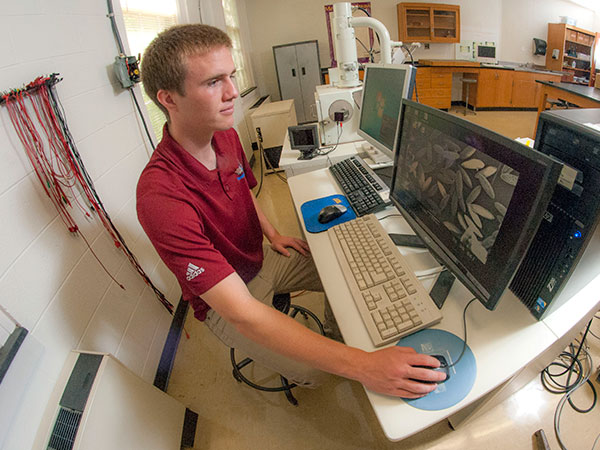Student-athlete spends summer researching tin whisker growth

Jonathan Turnley, a double major in physics and chemistry, decided on his Summer Fellows research topic after learning about the research that Dr. Chad Rodekohr conducts on tin whiskers. Turnley found Rodekohr’s research appealing since it involves both physics and chemistry.
Tin whisker growth is a poorly understood phenomenon in which tiny, threadlike hairs form on metallic surfaces, especially within electronics. Preventing whisker growth could lead to the production of more reliable electronic devices.
“It was recently discovered that etching tin causes whiskers to grow remarkably fast,” said Turnley. “I will be working to control the growth of tin whiskers and better understand why and how etching causes whiskers to grow.”
For his research, Turnley started with squares of brass covered by a thin layer of tin. By using an acid to remove, or etch, some of this tin and changing either the acid type, concentration, or time of submersion for each square, he hopes to understand more clearly how to control the inception and location of tin whisker growth.
A junior from Manhattan, Kan., Turnley plays for the men’s soccer team. During his sophomore year, he served as the vice president of the Society of Physics Students and as the vice president of the Students for Environmental Education.
“We are dealing with some pretty recent discoveries that aren’t clearly understood,” said Turnley concerning his research. “We are hoping that with future research we will be able to control the growth of whiskers in ways that they can actually be useful in electronics.”
Throughout the summer, Turnley is working closely with Rodekohr, assistant professor of physics. “Jonathan will be utilizing his chemistry background to chemically etch away controlled volumes of tin and then using his physics background to examine the results of his etching in a scanning electron microscope,” said Rodekohr. “His background in physics and chemistry makes him the ideal candidate for this project.”
After graduating from PC, Turnley hopes to attend graduate school to study physics, chemistry, or engineering.
“My goal is to one day become a professor in one of these areas,” said Turnley. “Being a professor appeals to me because it would allow me to stay in an academic environment and continue doing research.”
Presbyterian College is located on a striking 240-acre campus in Clinton, between Columbia and Greenville, S.C. Offering challenging academics and a culture of honor, ethics, and service that prepares students to be leaders in communities, PC offers its students the benefit of engaging with an exceptional faculty who take individual interest in their students’ well-being, both personally and in the classroom. The Presbyterian College School of Pharmacy opened in 2010, and is dedicated to the ideals of leadership, honor to the profession, and service to the community. For more information about Presbyterian College, visit www.presby.edu.
